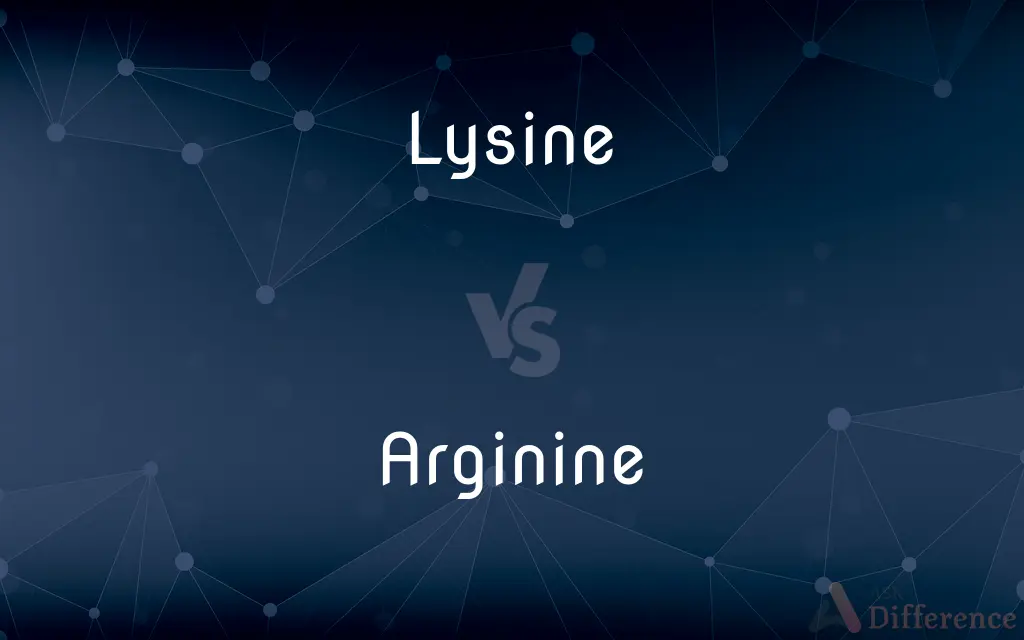Lysine vs. Arginine — What's the Difference?
Edited by Tayyaba Rehman — By Urooj Arif — Updated on April 17, 2024
Lysine and arginine are essential amino acids, with lysine primarily involved in growth and tissue repair, while arginine boosts immune function and improves heart health.

Difference Between Lysine and Arginine
Table of Contents
ADVERTISEMENT
Key Differences
Lysine is crucial for protein synthesis and plays a key role in growth and calcium absorption, whereas arginine is noted for its ability to enhance blood flow and stimulate the release of growth hormones. Both are essential amino acids, but their roles in the body differ significantly.
Lysine is generally found in high amounts in meat, fish, eggs, and dairy products, highlighting its presence in animal proteins. On the other hand, arginine is abundant in nuts, seeds, and legumes, making it prevalent in plant-based sources.
Regarding supplementation, lysine supplements are often taken to prevent or treat herpes outbreaks, while arginine supplements are popular among athletes for muscle growth and recovery. This highlights their varied applications based on their health benefits.
Lysine cannot be synthesized by the human body and must be obtained from dietary sources, whereas arginine, though typically synthesized adequately by the body, may require supplementation during times of stress or illness, indicating their different physiological demands.
Comparison Chart
Health Benefits
Supports tissue repair, antiviral effects
Improves heart health, supports muscle growth
ADVERTISEMENT
Dietary Sources
Meat, fish, eggs, dairy
Nuts, seeds, legumes
Supplementation
Used to prevent herpes outbreaks
Used by athletes for muscle recovery
Synthesis
Cannot be synthesized by humans
Can be synthesized, supplementation needed under stress
Compare with Definitions
Lysine
Lysine must be obtained through diet or supplements.
Meat and dairy are excellent sources of lysine.
Arginine
It is involved in wound healing and the immune response.
Arginine is essential for proper recovery from injuries.
Lysine
Lysine is an essential amino acid important for growth and tissue repair.
Lysine supplements are often recommended for rapid tissue recovery.
Arginine
Arginine promotes the release of growth hormone.
Bodybuilders often take arginine to stimulate muscle growth.
Lysine
Lysine supports immune function by combating viruses.
Lysine can help reduce the frequency of herpes outbreaks.
Arginine
This amino acid is a precursor for the synthesis of nitric oxide.
Nitric oxide produced from arginine aids in vascular dilation.
Lysine
It is indispensable in the production of various proteins.
Without sufficient lysine, the body cannot produce certain hormones.
Arginine
Arginine can be synthesized by the human body.
Despite its production, additional arginine may be required during bodily stress.
Lysine
It aids in calcium absorption and collagen formation.
Consuming enough lysine helps maintain strong bones and healthy skin.
Arginine
Arginine, also known as l-arginine (symbol Arg or R), is an α-amino acid that is used in the biosynthesis of proteins. It contains an α-amino group, an α-carboxylic acid group, and a side chain consisting of a 3-carbon aliphatic straight chain ending in a guanidino group.
Lysine
Lysine (symbol Lys or K) is an α-amino acid that is used in the biosynthesis of proteins. It contains an α-amino group (which is in the protonated −NH3+ form under biological conditions), an α-carboxylic acid group (which is in the deprotonated −COO− form under biological conditions), and a side chain lysyl ((CH2)4NH2), classifying it as a basic, charged (at physiological pH), aliphatic amino acid.
Arginine
An amino acid, C6H14N4O2, obtained from the hydrolysis or digestion of plant and animal protein.
Lysine
An essential amino acid, C6H14N2O2, obtained by the hydrolysis of proteins and required by the body for optimum growth.
Arginine
An amino acid found in animal foods that plays an important role in several physiological processes.
Lysine
(amino acid) An essential amino acid, C6H14N2O2.
Arginine
A bitter tasting amino acid found in proteins and necessary for nutrition; its absence from the diet leads to a reduced production of spermatozoa
Lysine
An essential amino acid found in proteins; occurs especially in gelatin and casein
Common Curiosities
What are common dietary sources of arginine?
Arginine is abundant in nuts, seeds, and legumes.
What are the benefits of arginine supplementation for athletes?
Arginine is popular among athletes for promoting muscle growth and recovery.
Can lysine and arginine be synthesized by the body?
Lysine cannot be synthesized by the human body and must be obtained from diet, whereas arginine is generally synthesized but may require supplementation.
What is lysine primarily used for in the body?
Lysine is used for protein synthesis, growth, and calcium absorption.
Can lysine and arginine both support immune function?
Yes, both support immune function but in different ways: lysine through its antiviral properties and arginine through its role in immune cell function.
How do lysine and arginine differ in their role in hormone production?
Lysine is involved in the production of hormones like human growth hormone, whereas arginine stimulates the release of growth hormone directly.
What are common dietary sources of lysine?
Lysine is commonly found in meat, fish, eggs, and dairy products.
Why might someone supplement with lysine?
Lysine supplements are often taken to prevent or treat herpes virus outbreaks.
Are there any specific health conditions that benefit from lysine supplementation?
Yes, lysine supplementation is beneficial for those suffering from herpes simplex virus to decrease the frequency and severity of outbreaks.
How are lysine and arginine used differently in medical treatments?
Lysine is primarily used in the treatment of viral infections, while arginine is used in cardiovascular health management.
What are the symptoms of lysine deficiency?
Symptoms of lysine deficiency include fatigue, dizziness, reduced appetite, and slowed growth.
What is the impact of lysine on calcium levels?
Lysine helps in the absorption of calcium from the diet, thereby aiding in bone health.
What are the symptoms of arginine deficiency?
Symptoms of arginine deficiency can include poor wound healing, hair loss, constipation, and rashes.
Share Your Discovery

Previous Comparison
Port vs. Harbor
Next Comparison
Insect vs. ReptileAuthor Spotlight
Written by
Urooj ArifUrooj is a skilled content writer at Ask Difference, known for her exceptional ability to simplify complex topics into engaging and informative content. With a passion for research and a flair for clear, concise writing, she consistently delivers articles that resonate with our diverse audience.
Edited by
Tayyaba RehmanTayyaba Rehman is a distinguished writer, currently serving as a primary contributor to askdifference.com. As a researcher in semantics and etymology, Tayyaba's passion for the complexity of languages and their distinctions has found a perfect home on the platform. Tayyaba delves into the intricacies of language, distinguishing between commonly confused words and phrases, thereby providing clarity for readers worldwide.















































